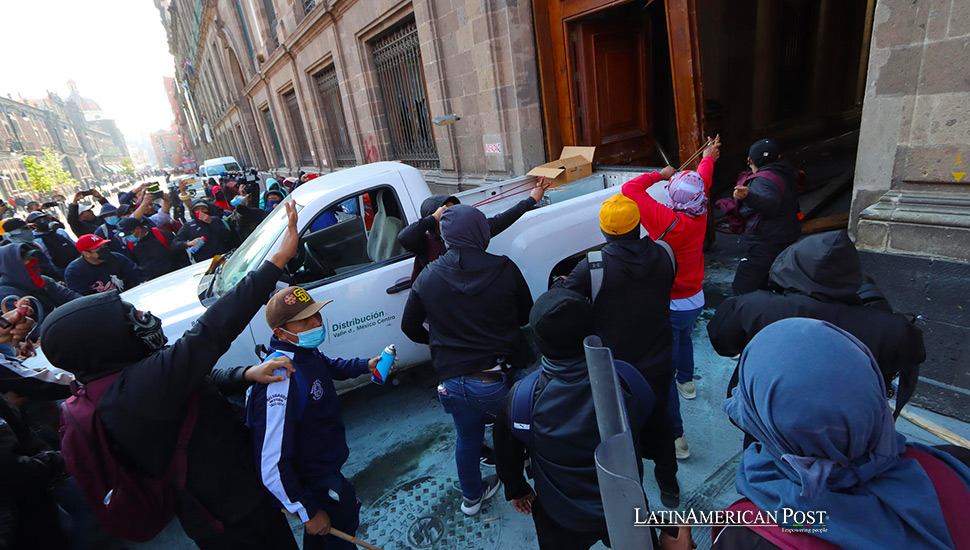Mexico’s Struggle for Justice in the Ayotzinapa Disappearances

In the heart of Mexico City, protestors’ recent attempts to breach the National Palace doors symbolize a nation’s ongoing struggle for justice over the 2014 Ayotzinapa disappearances. This act of desperation reflects a broader Latin American battle against state-sanctioned violence and impunity.
Ayotzinapa’s Lingering Wound
In the heart of Mexico City, a single door stands as a stark symbol of a nation grappling with a haunting memory: the 2014 disappearance of 43 students from the Ayotzinapa Rural Teachers’ College. Last week, a group of protestors, driven by frustration and a yearning for justice, attempted to breach the National Palace doors, shattering the quiet calm of the presidential residence. This act, captured by local media, laid bare the raw emotions and the enduring quest for truth that continue to resonate in Mexico, highlighting a struggle not isolated but deeply intertwined with the broader fight for human rights across Latin America.
The Ayotzinapa disappearances transcended a national tragedy, sending shockwaves throughout Latin America. The incident, where 43 students were abducted by local police and allegedly handed over to a criminal gang, became a potent symbol of the region’s vulnerability to state-sanctioned violence and the widespread struggle against impunity.
From Guatemala’s fight against past government atrocities to the ongoing human rights crisis in Venezuela, the Ayotzinapa case resonated with communities grappling with historical and ongoing injustices. It served as a stark reminder of the fragile nature of democratic institutions and the persistent fight for accountability across the region.
Impact on Institutions
Controversy and accusations of insufficient investigation have marred the Mexican government’s handling of the Ayotzinapa case. Despite initial investigations pointing towards the involvement of local authorities and a criminal organization, concrete evidence and definitive answers remain elusive. This lack of progress has fueled public outrage and distrust towards the government, leading to ongoing protests and continuous calls for justice.
The frustration extends beyond the national borders. Across Latin America, where the fight against human rights violations forms a collective struggle, the Ayotzinapa case represents a shared concern. The lack of resolution not only impacts the families of the victims but also serves as a chilling reminder of the potential for impunity to prevail in the face of heinous crimes.
The attempted breach of the National Palace by protestors cannot be viewed solely as an act of desperation. It is a potent symbol of the complex political landscape surrounding the Ayotzinapa case. President Lopez Obrador’s comments during his press conference, where he accused the protestors of being manipulated and seeking to provoke, highlight the politicization of the tragedy.
The media plays a crucial role in navigating this complex narrative. While local media captured the dramatic visuals of the attempted breach, it is essential to consider their broader role in shaping public opinion and ensuring transparency throughout the investigation process. Independent media outlets can serve as watchdogs, holding authorities accountable and ensuring the voices of the victims’ families and the broader public are heard.
Ayotzinapa’s Ripple Effect
The Ayotzinapa disappearances inflicted a devastating blow not only on the families of the victims but also on the broader Mexican society. The tragedy had a significant economic impact, particularly on the rural community of Ayotzinapa. The families of the missing students lost their primary source of income and support, plunging many into financial hardship.
Furthermore, the social fabric of the community was deeply affected. The disappearances instilled a sense of fear and insecurity, impacting daily life and hindering trust in authority figures. The trauma continues to reverberate within the community, casting a long shadow on future generations.
As Mexico grapples with the Ayotzinapa disappearances, initiatives to commemorate the victims and pursue justice continue. The families of the missing students, along with human rights organizations, have tirelessly advocated for a thorough and impartial investigation.
Memorials have been erected, keeping the students’ memory alive and serving as a constant reminder of the fight for justice. While crucial for healing and fostering dialogue, these efforts run parallel to the ongoing legal proceedings, which finally hold the potential to bring closure and accountability.
The families of the 43 disappeared students have endured unimaginable suffering, grappling with the emotional and psychological trauma of losing their loved ones under such horrific circumstances. The lack of concrete answers and ongoing legal proceedings have further exacerbated their pain, creating a sense of helplessness and despair.
The families have faced constant public scrutiny and political maneuvering, further complicating their grieving process. The psychological impact of the disappearances transcends the immediate family members, affecting the broader community of Ayotzinapa and leaving deep scars on the collective consciousness of Mexico.
The Ayotzinapa disappearances serve as a stark reminder of the enduring fight for justice in Mexico and across Latin America. While the single door breached by protestors may be repaired, the wounds inflicted on the nation and the region run deeper.
The pursuit of truth and accountability in the Ayotzinapa case remains crucial, not just for the victims’ families but for the broader Latin American community seeking to overcome historical injustices and build a future based on transparency, human rights, and the rule of law. As the search for answers continues, the Ayotzinapa case is a powerful testament to the collective responsibility to uphold justice and ensure that such violations never fade into forgotten memories.
The Ayotzinapa disappearances sparked widespread international condemnation and calls for a thorough investigation. The United Nations Human Rights Council condemned the abductions and urged the Mexican government to conduct an adequate investigation. Additionally, several human rights organizations, including Amnesty International and Human Rights Watch, have closely monitored the case and pressured the Mexican authorities to take concrete action.
International Condemnation: Ayotzinapa on the Global Stage
The international community’s involvement has bolstered domestic efforts to seek justice and ensured that the case remains in the global spotlight. However, the need for significant progress continues to raise concerns about Mexico’s commitment to upholding its human rights obligations.
Despite the years of frustration and despair, recent developments offer hope. In 2023, a truth commission established by the current administration concluded that the Mexican military was directly involved in the disappearances, contradicting previous official narratives. This revelation, while met with skepticism by some, signifies a shift towards acknowledging the possible involvement of state actors in the tragedy.
Also read: Drought’s Grip on Mexico: A Looming Threat to Agriculture and Inflation Across Latin America
The long road to justice in the Ayotzinapa case continues, marked by ongoing investigations, legal battles, and unwavering demands for accountability. The families of the victims, forever marked by the tragedy, continue their relentless pursuit of truth and justice, serving as a powerful symbol of resilience in the face of unimaginable loss. As the struggle unfolds, the Ayotzinapa disappearances serve as a potent reminder of the collective responsibility to uphold human rights, combat impunity, and ensure that such violations do not become a chilling footnote in history.




